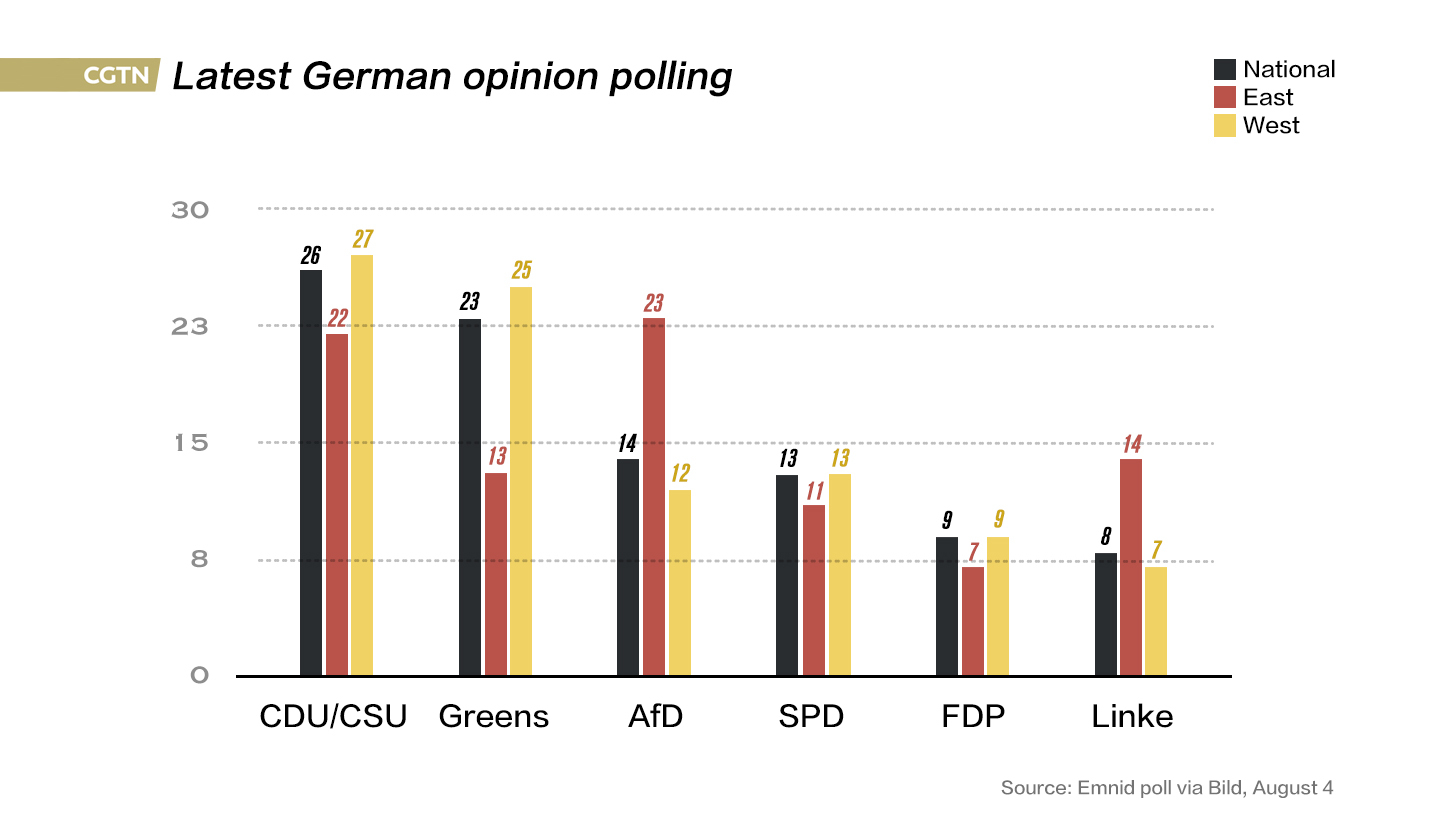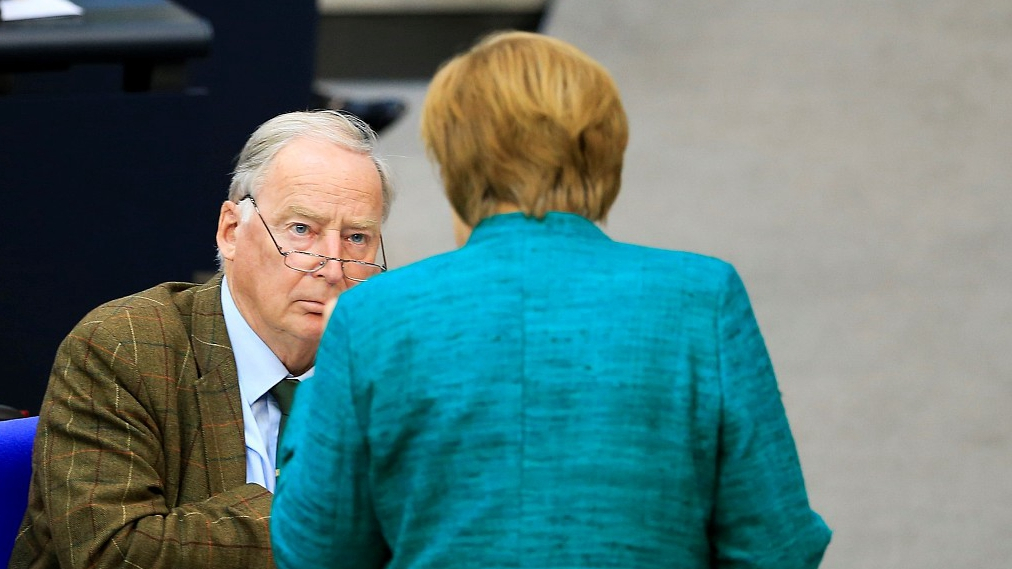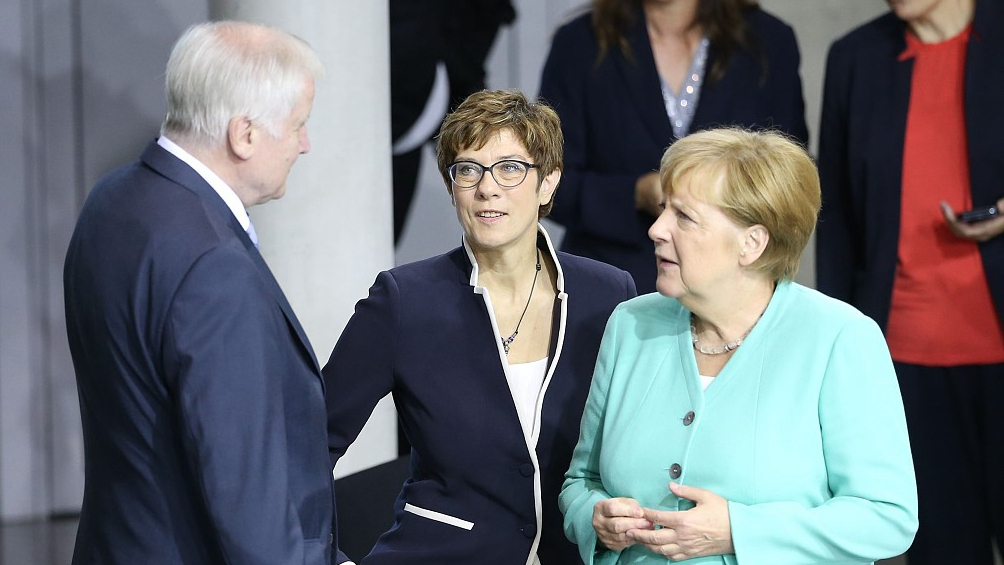

The far-right Alternative for Deutschland (AfD) is the leading party in eastern Germany, according to a new poll, ahead of regional elections likely to put further pressure on the country's fragile coalition government. The poll also indicates a distinct and growing east-west division in the country, nearly 30 years after reunification.
What are the numbers?
The Emnid poll, published in the Bild newspaper on Sunday, suggests that the AfD is backed by 23 percent of voters in eastern Germany. That puts the far-right party ahead of Angela Merkel's Christian Democratic Union (CDU, 22 percent), the far-left Linke (14 percent), the Greens (13 percent) and the Social Democrats (SPD, 11 percent).
The picture is reversed for the AfD in the west, where it lies in fourth place on 12 percent behind the CDU on 27 percent, the Greens on 25 percent and the SPD on 13 percent.

The poll places the AfD at 14 percent nationally, with the CDU at 26 percent, the Greens on 23 percent, the SPD at 13 percent, liberal Free Democrats (FDP) on nine percent and far-left Linke on eight percent.
The polling echoes the results of the European Parliament elections, in which the AfD performed well in the east despite dropping by two points nationally, and the 2017 federal elections.
Why is the AfD popular in the east?
The AfD became Germany's third largest national party in 2017, the first election in which it won any representation in the Bundestag, and the largest opposition party in the parliament.
It was propelled by voter disquiet over Merkel's decision to welcome millions of asylum seekers into the country at the height of the migrant crisis in 2015.

German Chancellor Angela Merkel (front) chats with Alexander Gauland, parliamentary group leader of the Alternative for Germany, in Berlin, June 28, 2018. /VCG Photo
The party was founded in 2013 by academics opposed to the Greek bailout during the European financial crisis, but since a power struggle in 2015 has taken on an anti-immigrant, anti-Islam, nationalistic policy platform and moved to increasingly extreme right-wing positions.
The AfD has been much more effective in eastern Germany where, nearly three decades on from reunification, livings standards and wages remain lower than the rest of the country and unemployment is higher.
While young and urban voters in the west have trended heavily towards the Greens, the AfD's framing of migration and Germany's renewable energy transition as economic threats has wooed support in the east. The far-left Linke also polls twice as well in the east as the west.
Why does it matter?
The Emnid poll points to two significant issues: Further problems for the national coalition in the months ahead and a hardening split between west and east.
Upcoming regional elections – three eastern states will vote in the next two months – could have a profound effect on Germany's fragile coalition government, which has teetered repeatedly since it was formed after months of negotiations in 2018.
The CDU has clashed with its Bavarian sister party the Christian Social Union on migration, and support for the third coalition partner, the SPD, has been in freefall.

Germany's new Defence Minister Annegret Kramp-Karrenbauer (C) talks with Interior Minister Horst Seehofer and Chancellor Angela Merkel (R) in Berlin, Germany on July 24, 2019. /VCG Photo
The latest polling indicates that the far-right party is in contention to topple the SPD in Brandenburg and the CDU in Saxony on September 1, and both the AfD and Linke only narrowly trail the CDU in Thuringia, which goes to the polls on October 27.
Other parties may join forces to prevent the AfD taking control of any of the states, but losing to the populist party would nevertheless be damaging for any of the national governing partners and put the coalition under fresh strain.
The sharp divide between western Germany and the former communist east is an unsolved problem, despite heavy investment, and poses problems for the traditional major parties.
The AfD flourishes in the east, but has struggled to establish a strong base of support in the west. The starkest contrast is with the Greens, who sit 10 points behind the AfD in the east but nine points ahead nationally. This division will force the CDU and SPD into changes if they wish to counter the populist support in the east.
What next?
The summer political lull is underway with the Bundestag on recess, but the AfD is likely to continue to make headlines as campaigning steps up ahead of the regional elections and the countdown to the 30th anniversary of the fall of the Berlin Wall approaches.
With three tight regional elections ahead, the remainder of 2019 could be tough for the coalition and Merkel, who has already stepped down as party leader and would not fight a new election.

Copyright © 2018 CGTN. Beijing ICP prepared NO.16065310-3
Copyright © 2018 CGTN. Beijing ICP prepared NO.16065310-3